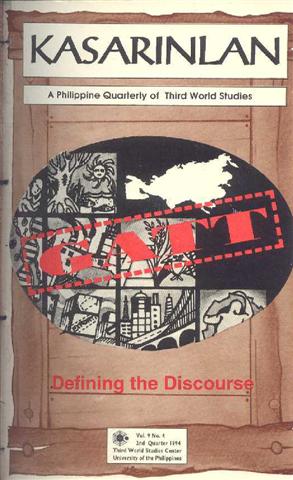Why the GATT is a Burden Filipino Farmers Refuse to Bear
Abstract
The paper challenges articles published in the Manila Chronicle that champion the notion that the Philippine economy will greatly benefit from the Uruguay Round of General Agreement on Tariffs and Trade (GATT) negotiations, either immediately or in the near future. In particular, it disputes the articles written by Fermin Adriano, who echoes the government hard-sell of GATT’s benefits in spite of the lack of data to support such claims, and Alexander Magno, who accedes that small farmers will be adversely affected by GATT’s imperatives, but also says that these farmers must suffer for the greater good. The paper argues that these articles fail to properly discuss the negative effects of the GATT to the rural poor of the Philippines, who comprise the majority of the Filipino population. It calls for a reversal of the government’s bias against agriculture in favor of industrialization. As the treaty stipulates the elimination of nontariff quantitative import restrictions, the bar on the grant of government subsidy to local farmers, and the implied empowerment of multinational corporations to determine the price of patented agricultural products, GATT will severely handicap poor agricultural communities in the worldwide trading table. Hence, the treaty would further impoverish the rural poor. In order for locally grown agricultural products to become competitive against foreign alternatives, the paper states that farmers from the most marginalized sectors must be economically and politically empowered, a process that entails the breaking up of monopolies over the country’s means of production. Only then, the paper argues, can Filipino farmers find themselves capable of agreeing to the terms of GATT. It concludes by calling for a stop to the government’s practice of kowtowing to the economic framework that perpetuates inequity in world trade.
Published
2008-06-06
How to Cite
INSTITUTE, Philippine Peasant.
Why the GATT is a Burden Filipino Farmers Refuse to Bear.
Kasarinlan: Philippine Journal of Third World Studies, [S.l.], v. 9, n. 4, june 2008.
ISSN 2012-080X.
Available at: <https://journals.upd.edu.ph/index.php/kasarinlan/article/view/900>. Date accessed: 22 aug. 2025.
Section
Features
Keywords
GATT; Uruguay Round; Philippines; agriculture; farmers
By submitting a manuscript, the authors agree that the exclusive rights to reproduce and distribute the article have been given to the Third World Studies Center.



